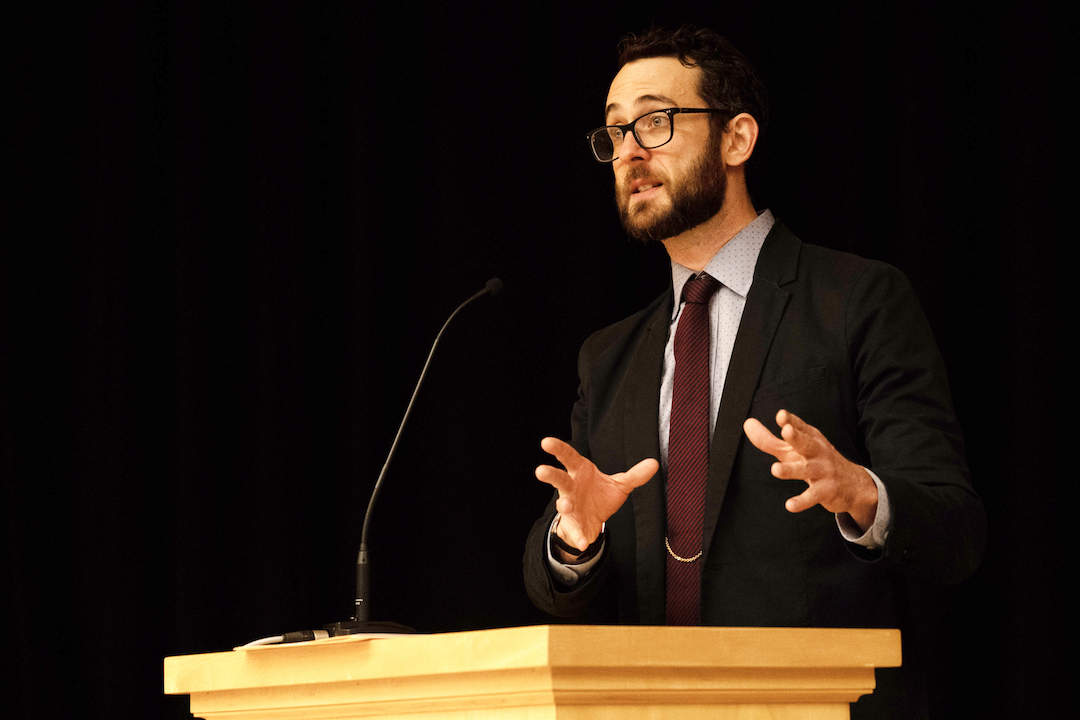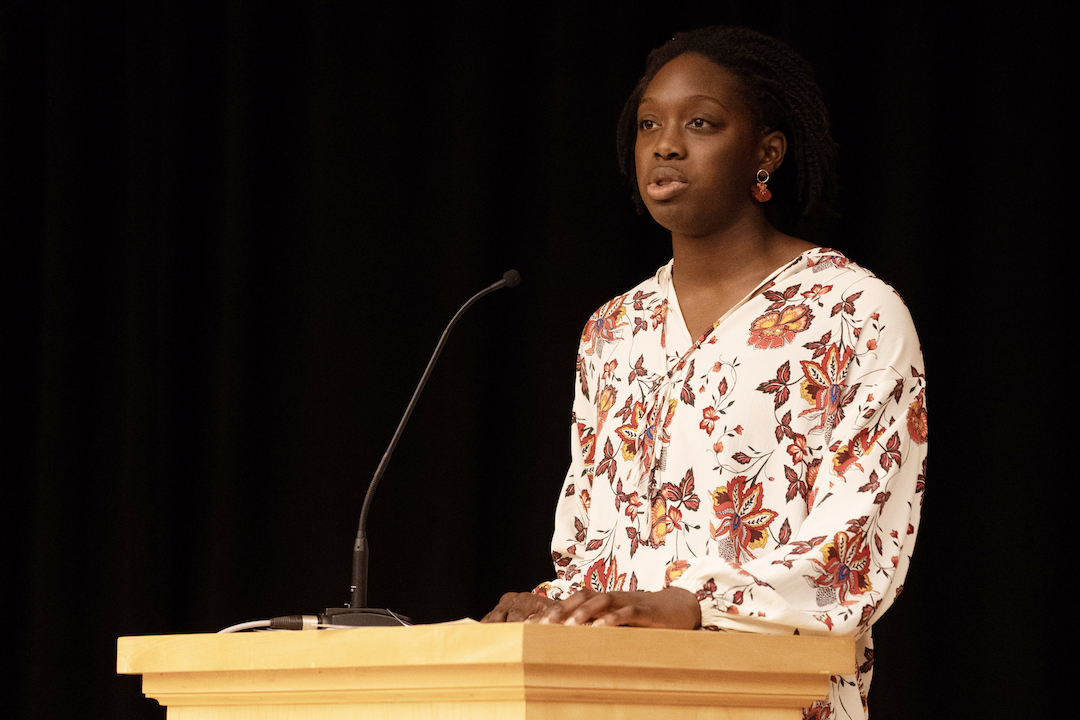‘Intersections of Race in Athletics’ sparks conversation
February 28, 2020
 Angel Ramirez
Angel RamirezWith open minds and honest language, student athletes confronted the effects of race on their teams and the inclusiveness—or lack thereof—of Bowdoin’s athletic culture Wednesday night at the Athletes of Color Coalition’s (AOCC) fourth iteration of “Intersections of Race in Athletics.”
After a one-year hiatus, the event returned this year to create a forum for student athletes of color to express frustrations, concerns and fears about being part of majority-white teams, sharing testimonies targeted at the heart of racial issues presented on Bowdoin teams.
However, before the personal stories began, Visiting Assistant Professor of Religion Joshua Urich delivered a moving speech about the origins of race in America.
“Race is the attribution of non-biological characteristics to a phenotypically similar group. What does this mean? People who look like X tend to do Y. And Y is generally not a biologically inherited trait,” said Urich. “Sometimes race isn’t even an action we intentionally choose to do. It’s an unconscious or uncontrollable physical reaction. It’s that feeling of being at a place when you realize you’re the only person in a room that looks like you.”
Urich argued that race, in both athletics and everyday life, can be combated through frank conversation and forming personal relationships. He took the case of African-American musician Daryl Davis as an example.
“Some of his best friends are in the [Ku Klux] Klan,” Urich said. “He actually has a collection of 25 Klan robes in his closet because he’s building a museum of all of the Klan paraphernalia his friends give him when they renounce their racism and quit the Klan. Because that’s what they do after becoming friends with Daryl Davis.”
After this uplifting message about race and conquering racist predispositions, student athletes of color took to the stage and shared their experiences with racism, overt or unintentional, on their own sports teams.
First to step up to the podium was field hockey player Manveer Sandhu ’22. She described how field hockey has always been central to her life and her development as a person, but being questioned about India by an opposing coach made her second-guess her role in the athletic world.
“After a game during my first year at Bowdoin, the coach from the opposing team came up to me asking what I knew about India,” said Sandhu. “She proceeded to tell me she was going to a remote place in India where she would be teaching kids how to play [field hockey] to provide them with another outlet in life besides child marriage.”
In that moment, she felt as though she had been defined by her Indian identity; she was nothing more to this coach than a walking representation of India.
“I felt deeply ashamed. I felt as though I should also be doing something to help the country my family is from,” said Sandhu. “I felt embarrassed I knew so little about India in terms of personal experience.”
Sandhu, like others on campus and on athletic teams, found support in a fellow teammate of color and began to understand that she was not to blame in this situation. Throughout the night, the theme of solidarity with fellow athletes of color on a team came up time and time again.
First-year swimmer Ayana Opong-Nyantekyi has found it difficult to be on a team that is so racially and socioeconomically different from her, but support from a senior athlete of color on her team has helped her navigate the team’s dynamics.
“Outside of practices, it’s encouraged for us to attend mixers. The music is not usually too great, and rarely is [it] music one could dance to,” said Opong-Nyantekyi. “Evidently, my white teammates do not really dance and since none of them dance, I don’t feel comfortable dancing.”
 Angel Ramirez
Angel RamirezShe spoke about feeling both invisible, as her experience is at times overlooked, and hypervisible, because of her skin color. Most of all, she is shocked by her teammates’ spending habits, further highlighting disparity in socioeconomic class.
“They have no problem buying different apparel, paying for attire so the whole team matches, or even going out to dinners for team bonding,” said Opong-Nyantekyi. “The way they spend money and are able to buy things without second thought was eye-opening to me.”
She does not blame them, but nonetheless feels marginalized because each purchase she makes needs to be thought out and the consequences considered.
“I know some people quit their teams. I know some people leave Bowdoin because of the way people of color feel here,” Opong-Nyantekyi said. “And I’m lucky enough to not feel as though I have to quit my team, and that I have a team that respects me. But I feel as though it is worth sharing, because things for me and other athletes of color at Bowdoin can be better.”
A former member of the track and field team, Amani Hite ’20 recounted her experiences on the team that led her to quit. A proxy for Hite read the story, as Hite could not attend the event.
“Someone had me reach out to a recruit. Big mistake. Of course they would tell me to reach out to the Black recruit. I mean, it had to be a race thing, because she didn’t even do the same event as me,” read the proxy. “I quit. I asked myself the question, ‘Why [do] the majority of people of color, especially black women, quit the track team?’ Well, that’s easy. We don’t fit in.”
Encouraging white athletes to reflect on these poignant and often painful stories was the intention of the event’s organizers.
“It’s just about making an inclusive environment and making sure that the culture of the team is welcome to race and anything like race, including class, sexuality and gender preference,” said event coordinator and AOCC President Paula Petit-Molina ’20.
“Certain things and pressures go into being an athlete of color that not everyone may understand, so having that openness and being able to see how people’s experiences are different is something I hope people walk away with,” said Lester Jackson ’21, one of the vice presidents of the AOCC.
While this event aims to open up new spaces for dialogue, there is still much to consider surrounding athletes of color and their experiences at Bowdoin. Acknowledging this, Urich posed some questions to the audience.
“I’m going to leave you with some questions to consider,” said Urich. “How do you do race? What actions do you take that make race happen? How do your teams do race? What about your college? Your friends and family? What about [us] as a nation? How do we do race? Think about that.”

Comments
Before submitting a comment, please review our comment policy. Some key points from the policy: